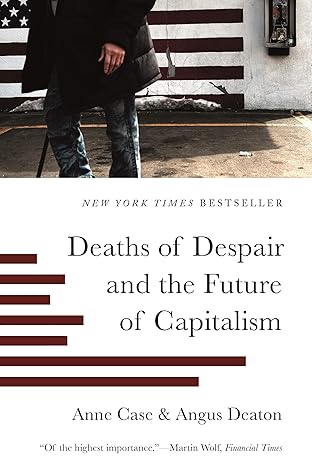More on this book
Community
Kindle Notes & Highlights
Death from drugs, suicide, and alcohol pose the greatest risk to less-educated Americans, and almost all of the increase in these deaths since the mid-1990s is among people without a four-year college degree.
Free market competition can do many things, but there are also many areas where it cannot work well, including in the provision of healthcare, the exorbitant cost of which is doing immense harm to the health and wellbeing of America. If governments are unwilling to exercise compulsion over health insurance and to take the power to control costs—as other rich countries have done—tragedies are inevitable.
the fastest-rising death rates were from three causes: suicides, drug overdoses, and alcoholic liver disease.
The increase in deaths of despair was almost all among those without a bachelor’s degree.
Jobs are not just the source of money; they are the basis for the rituals, customs, and routines of working-class life. Destroy work and, in the end, working-class life cannot survive. It is the loss of meaning, of dignity, of pride, and of self-respect that comes with the loss of marriage and of community that brings on despair, not just or even primarily the loss of money.
We believe that the healthcare system is a uniquely American calamity that is undermining American lives.
The rising economic and political power of corporations, and the declining economic and political power of workers, allows corporations to gain at the expense of ordinary people, consumers, and particularly workers.
More generally, the American healthcare system is a leading example of an institution that, under political protection, redistributes income upward to hospitals, physicians, device makers, and pharmaceutical companies while delivering among the worst health outcomes of any rich country.
globalization and automation, which are faced by all, need not reduce wages as has happened in the US, let alone bring an epidemic of death. American healthcare bears much of the blame, as does policy, particularly the failure to use antitrust to combat market power, in labor markets perhaps even more than goods markets, and to rein in the rent-seeking by pharma, by healthcare more generally, and by banks and many small- or medium-size business entrepreneurs, such as doctors, hedge fund managers, the owners of sports franchises, real estate businesspeople, and car dealers.
The opioid epidemic did not happen in other countries both because they had not destroyed their working class and because their pharmaceutical companies are better controlled and their governments are less easily influenced by corporations seeking profits.
In 2017, hospitals spent $450 million on advertising in the US.
We shall argue that we live in a mirror image of a Robin Hood society, one in which resources are indeed being redistributed, not downward, from rich to poor, as Robin Hood was reputed to do, but upward, from poor to rich.
Globalization and automation are more important players here; that their effects are worse in the US than elsewhere is because of America’s unique history of race, its limited welfare provision, and its absurdly costly healthcare system.
Many economists who think about income distribution endorse the view, first extensively used in economics,2 and which philosophers now call “prioritarianism,”3 that the more people have, the less weight (priority) their wellbeing should be given in policy making.
It is not possible for an unregulated market to provide a socially acceptable degree of coverage; as Kenneth Arrow noted long ago, “The laissez-faire solution for medicine is intolerable.”9 Some amount of compulsion is required, as are subsidies for those who cannot pay. Reforms that deny those facts are doomed.
No one likes compulsion, perhaps especially Americans, who hate the idea that healthcare should be rationed, although apparently not when the rationing is done by money, excluding those who cannot pay.


